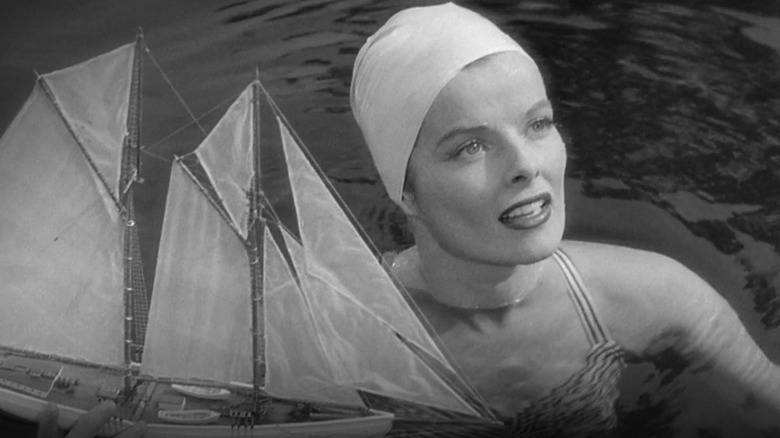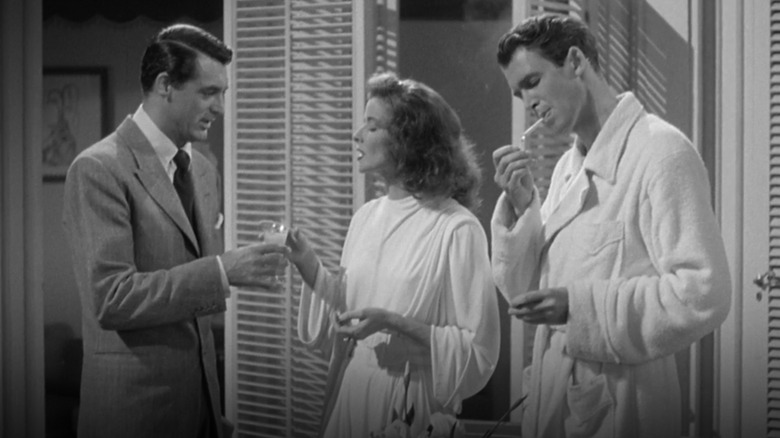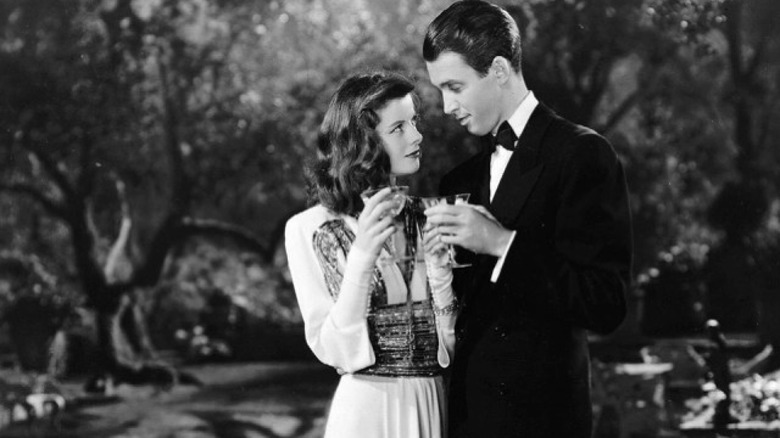The Original Script For The Philadelphia Story Was Incredibly Controversial
In the era of the Hays Production Code, filmmakers who wanted to make saucier, boundary pushing material had an incredibly narrow tightrope to walk. Prior to the MPA of today, the Code was Hollywood's censorship board, deeming which content was allowable in films. If your film was not approved by the Code, it would not get distributed. That means no profanity, no sex, no unpunished violence, and the story had to uphold any and all traditional values. This was not a case of being able to restrict who could see those elements based on age like today — they just would not be made, period. The Code, enforced by lead film censor Joseph Breen, had a stranglehold on Hollywood until the '50s and '60s. By then, cultural mores has begun to shift, and Hollywood needed to start finding ways to separate itself from the content on the rapidly rising medium of television, along with the growing popularity of international films, which did not abide by the same censorship principles as in the United States.
Of course, with any kind of restrictions, artists are going to have to figure out ways to turn them into creative opportunities. Filmmakers wanted to tell stories about sex, violence, and morally dubious situations. They just couldn't explicitly show those things on screen. One of the greatest films to get away with an enormous amount of innuendo and suggestion for sex is "The Philadelphia Story," the romantic comedy from director George Cukor and starring Katharine Hepburn, Cary Grant, and James Stewart. Adapted from the play by Philip Barry, this film had to tip-toe around so many subjects with tremendous caution in regards to sex that it almost did not even make it to the screen. What makes it even more remarkable is how many specific things Joseph Breen took issue with in the screenplay that ended up making it to the final film.
Naked, louse, stinking, and pregnant
"The Philadelphia Story" started out as a big hit on Broadway starring Katharine Hepburn, whom the part of Tracy Lord was written for. In Hollywood, Hepburn was at a low point, having starred in a string of box office flops. Hepburn brought along director George Cukor and writer David Ogden Stewart, whom she had previously collaborated with on another Philip Barry adaptation, "Holiday." Originally, the film was to be set up at Paramount Pictures, but the demands of Joseph Breen were a bit too much for Paramount to continue with the project. Michael Callahan of Philadelphia Magazine writes of Breen demands:
"A film that begins with a shot of Cary Grant putting his hand over Hepburn's face and shoving her to the ground wasn't going to slip under Breen's moral radar. Neither was one that displayed excessive drinking, a nude midnight swim, pinched buttocks, and intimations of a tawdry affair committed by the family patriarch. After reviewing the original play before its script adaptation, Breen sent a letter to Paramount Pictures in April 1939 outlining myriad objections and demands, which basically called for gutting the story. 'Throughout the screen treatment,' Breen wrote, 'there should be nothing that would reflect unfavorably on the institution of marriage.'"
Paramount moved the film over to MGM, which was the top studio at the time. They had the biggest stars, the most power, and the largest influence. They had Ogden Stewart take a pass on the adaptation. MGM was all set to make the movie, but Joseph Breen was not going to go so quietly into that goodnight. Callahan writes:
"Breen weighed in again, in a four-page letter to studio chief Louis B. Mayer, declaring that the treatment 'contains a number of items which are not acceptable, and which must be corrected in the finished picture.' Among them: no nude swim for Mike and Tracy; no suggestive dialogue; the drinking would have to be toned down; no butt-pinching; and no jokes made at the expense of the wedding minister. In addition, Breen strongly suggested that selected terms — among them 'naked,' 'louse,' 'stinking' and 'pregnant' — be deleted or changed. As the script was tweaked and production hummed along, Breen sent several more scolding, schoolmarmish letters, still harping on the use of 'stinks' and too much champagne being imbibed. He began to close his correspondence with the same ominous warning: 'You understand, of course, that our final judgment will be based on the finished picture.'"
'Don't say stinks, darling'
Amazingly, "The Philadelphia Story" got made and nearly everything Breen objected to on the page ended up in the final film. Hepburn's Tract and Stewart's Mike do have a midnight swim, but the notion of them being nude is implied rather than stated. As far as the drinking, James Stewart spends a large portion of the second half of the film playing out-of-his-mind drunk, and I have no doubt that how well he plays it and how funny he is during that time is what clinched him his Academy Award win that year. Tracy still gets her butt pinched, but you just don't see the fingers grab her. The word "stinks" still appears. In fact, when the word is used by Tracy's younger sister Dinah (Virginia Wiedler), their mother (Mary Nash) responds to the word with the line, "Don't say 'stinks,' darling. If absolutely necessary, 'smells,' but only if absolutely necessary."
Watching the final cut of "The Philadelphia Story," it would be difficult to find anyone who would strongly object to its content. Yes, the film operates with risqué material, but everything does fall in line within the standards of the Hays Code. You can see every supposedly explicit or immoral moment in your mind, but you just can't see it on screen. Joseph Breen just could not ding this movie for its content because these skilled filmmakers found ways to circumvent every restriction placed on them. "The Philadelphia Story" even falls into the long tradition of remarriage comedies, where a central couple gets divorced and is able to play the field a little before remarrying their original partner. Therefore, it upholds the sanctity of marriage. This film goes to show you that no matter what barriers are placed on the creation of your art, the ability to still make something great and say exactly what you want to say is possible.


